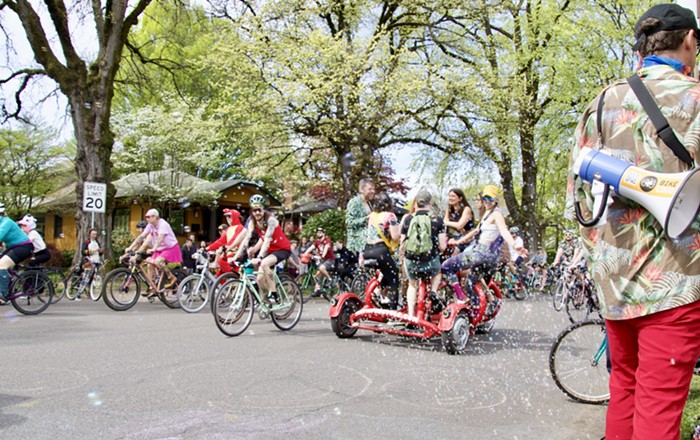IT'S QUITTING TIME at the Cascade General shipyards on Swan Island. Dozens of workers appear in hard hats and dirty coveralls, headed from the docks back to their Fords and Chevys. Some of them are trudging along on foot, as you might expect. But most are riding bicycles.
Surprisingly, bikes are a way of life at the Portland shipyard. The workers spend their days repairing huge ships on the docks, which are too big to walk around and too crowded to drive on. Blue-collar guys roll up to the exit gates on old cruisers or mountain bikes, their cigarettes and bags stuffed into milk crates strapped to their bike frames. They cycle slowly across the long stretches of pavement between the ships, the lunchroom, and the dry docks.
Roger DeCarlo skids to a stop on a tiny bicycle, his work boots dragging on the pavement. "It's a girl's purple Mongoose," he says proudly. "It was given to me by my friend Dave. His daughter outgrew it." The tires are flat and the brakes don't work, but Roger calls it "the perfect shipyard bike."
Roger's friend Jim rolls up on an old matte-black cruiser. The two men are boilermakers—they do welding, hot metalwork, and steel plate repair. Roger has been working here for four years; Jim for 20.
You can tell somebody's position on the docks by the type of bike they ride. The company buys shiny orange American-made cruisers for some of the foremen, and a few of the bosses ride around in golf carts. The newest workers take whatever they can find.
Jim grins when I ask where he got his bike. "My bikes are always stolen from a foreman," he says. "I just spray paint it so you can't see the orange paint." Maybe that's why he won't tell me his last name.
"Jim has had eight or nine bikes since I've known him," adds Roger. This one is heavy and hardy, with a handmade front rack holding a big leather rucksack.
But at the docks, nothing is certain. Men lose their jobs when a big ship sails away, only to be hired back when a new one arrives. Roger has been laid off a few times in the past four years. Bike ownership follows the employment cycles.
"When people are laid off, they just forget their bikes and abandon them," says Jim. "Other guys steal them, or raid them for parts."
There's a circle of racks near the entrance, holding communal bikes in various states of disrepair. Severed frames and wheels are locked to fences around the parking lot. A laid-off worker who's waiting for the bus tells me that the company comes through every few months and gets rid of all the rusty, abandoned bikes. And the cycle starts again.
More Bike Issue articles here!See the whole list of Pedalpalooza events here!














